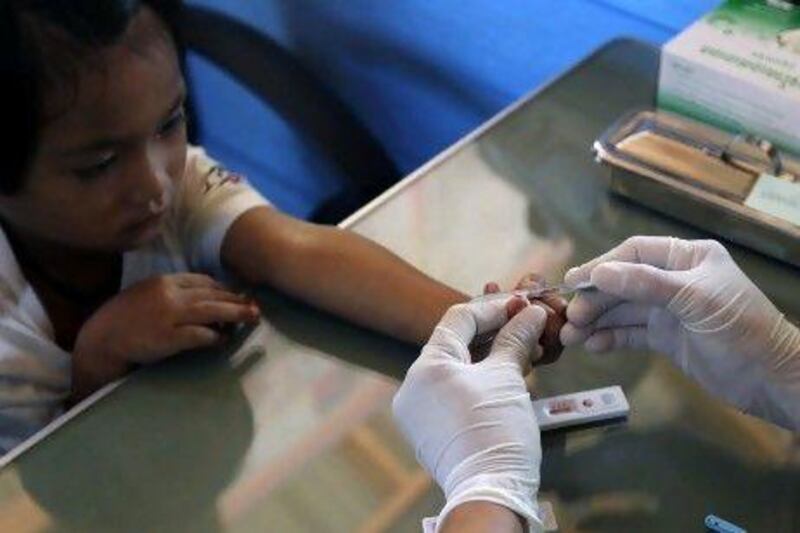SYDNEY // Drug-resistant malaria is spreading in Asia, experts warned as a high-level conference opened in Sydney yesterday with the aim of hammering out an action plan to strengthen the region's response.
Resistance to the drug used everywhere to cure the life-threatening disease has emerged in Cambodia, Thailand and Myanmar, said Richard Feachem, the director of global health at the University of California, San Francisco.
"In the Mekong Basin there is a growing and spreading problem of resistance ... to the drug artemisinin which is the front line drug worldwide," he said. "I think we've undoubtedly slowed it down, the international efforts have undoubtedly had a positive effect, but as far as we can tell it is still growing and it is still spreading.
"The danger is that this resistance may break out of South East Asia and crop up in Africa."
Also troubling to the fight against malaria, health officials this month will discuss the future of a US$460 million (Dh1.69 billion) malaria programme meant to provide cheap drugs for poor patients.
Since the programme began, the US President's Malaria Initiative, the world's second-biggest donor to malaria control after the Global Fund, has requested compelling evidence the subsidy programme works. Without that, the US group said it is not allowed by law to finance the malaria project. The World Health Organisation (WHO) has described the programme's future as uncertain.
About 22 countries in Asia Pacific still have malaria, but enormous progress has been made in combating the disease with the number of infections falling by about 50 per cent in the past decade, he said.
Yet there were still an estimated 30 million cases in Asia Pacific in 2010, and more than 40,000 deaths in South East Asia and Western Pacific, says WHO. Drug-resistant malaria was found on the Thailand-Cambodia border eight years ago, and since then on the Thailand-Myanmar frontier and in Vietnam.
Politicians, scientists and health experts will seek consensus on the actions needed to strengthen the region's response to malaria.
Fatoumata Nafo-Traore, who leads the Roll Back Malaria Partnership which aims to provide a coordinated global approach to fighting the disease, said the resistance was most troubling in border areas.
"The current concern is that even though it is localised in those border areas, there is a potential to have it spreading to other parts of the world, because of the population inflow, migrant workers and so on," she said. "This is why we are getting concerned, because this is the only class of antimalarial drug available to cure all uncomplicated malaria cases."
Resistance to artemisinin currently does not prevent patients being cured, thanks to other drugs it is used in concert with, but treatment usually takes longer.
It is not known why the resistance has emerged in Cambodia, one of the first countries to deploy the treatment 30 years ago.
But Ric Price, from the Centre of Tropical Medicine at Oxford in Britain, said counterfeit drugs and people not taking the full course of treatment could be factors.
"Artemisinin still remains the treatment of choice but it's under threat and we have to monitor where those areas are, where it is declining," he said.
The conference will discuss the need for vigilance against malaria, with Mr Feachem saying there had been numerous cases in the past when the disease had almost been eradicated but complacency saw it come sweeping back.
"It's the penalty of success," he said. "Some countries in the region now have very little malaria. When you're down to 100 cases a year, the politicians [lose interest] and malaria comes surging back."
One of the goals was for half of the malaria-afflicted countries in Asia-Pacific to eradicate the disease by 2025. "That would be a huge historic step forward, " he said.





